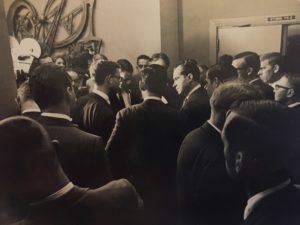A year or so after I graduated from the University of North Carolina at Chapel Hill and went to work for The Charlotte News Dad asked me to go to his warehouse in North Charlotte one Saturday afternoon and assemble some corrugated box partitions, see how many I could make in an hour.
He and Brother Dave had decided to get into the partition assembling business and he wanted to know how much they were going to have pay for labor.
So I put some together. The table I worked on –a sheet of plywood on top of a drum– was wobbly and the corrugated partition board I was assembling was crooked, but I was able to assemble 23, 24 partitions an hour.
I told Dad that, with practice, on a better table, with straight board, I could probably make 30 a hour.
At that time the minimum wage was $1.40 so I told him that he and Dave were going to have pay a nickel a piece. People would not do that kind of work for minimum wage, they were going to have to give them a chance to make a little more.
So that’s what they paid, five cents per partition.
A few weeks later Dad told me that they had a man making 40 partitions an hour. I was surprised. A little later he said the guy was making 60 an hour. I was a really surprised. Then he said the guy was making 80 an hour. I was amazed.
That’s when I asked for a job, working three nights a week and all day Saturday, assembling partitions. I got to where I could do 120 an hour in short spurts and average 100 an hour all day long. The News had paid me $120 a week to start — $3 an hour. I was making $5 a hour working nights and Saturdays assembling partitions, fabulous pay for unskilled labor, the equivalent of $38.18 an hour in 2018 dollars.
Postscript: There’s a lesson here somewhere, about how productivity goes up when productivity and pay are linked.
Coming Monday: The Intruder
NOTE: The Final Edition was one year old last week. I’ve posted two stories a week and I thought you might be interested in seeing a list of the 10 best read posts. Three of the top four are newspaper stories. Two are river stories and two are hiker stories.
Obviously, the earlier a story was posted the better chance it had to made the Top Ten but, anyway, here they are:
- “PIZ ZA! PIZ ZA! PIZ ZA!” Padding the Roanoke – 6/23/17
- Those Mean Old Newspapermen – 3/20/17
- This Was Not A Real Job – 9/4/17
- “Oh, Copyboy?” – 1/30/17
- Lost on Blood Mountain, Part 1 – 2/16/17
- Mind Game [Video] – 11/25/16
- Bear Bryant Called – 3/13/17
- “F” – 5/8/17
- Are You Boys Armed- 5/5/17
- He Might Be A Redneck – 12/26/16
